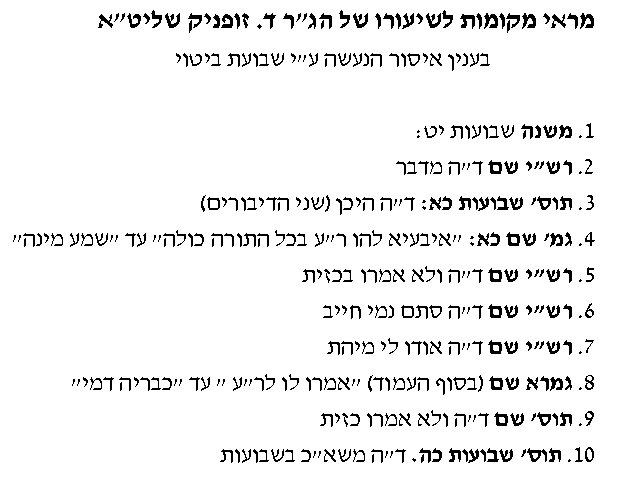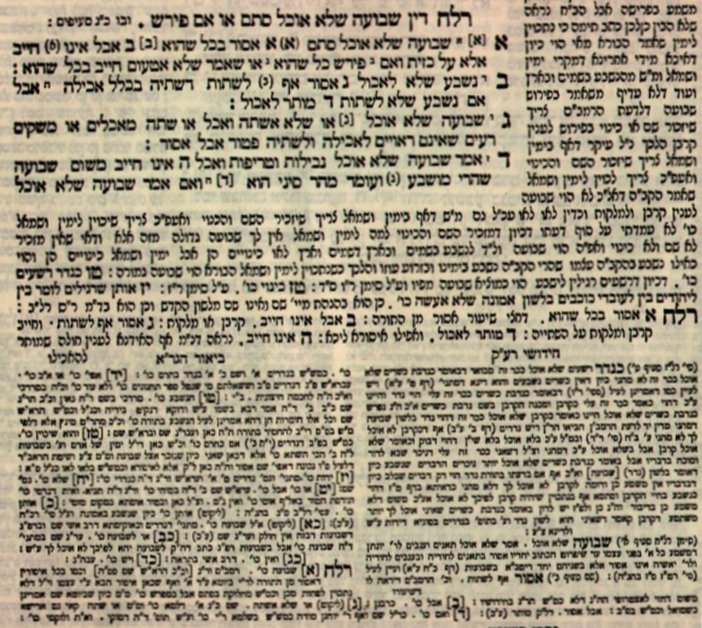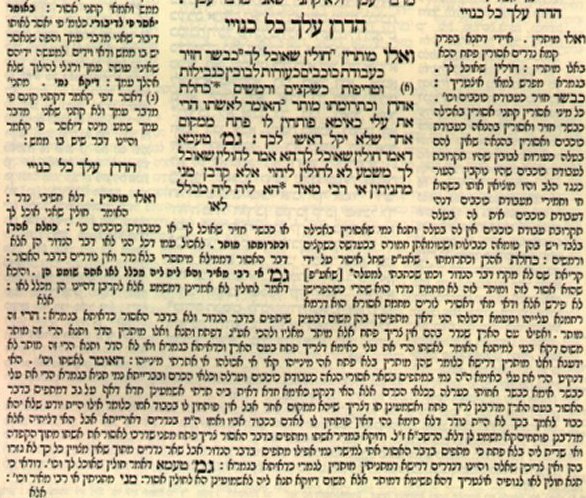The lecture for Sunday February 16, 5:00 PM Israel time
will be given by Hagaon HaRav Dov Zupnik, shlit'a
Sources appear below (in Hebrew)
followed by some basic material on the subject, in English

11. (Yoreh De'ah 238:1, with the Bi'ur ha'Gra #1)

12. (Nedarim 13b, Gemara after the Mishnah and Ran at the end of the page)

(Background to the Daf -- Shevuos 2:1)
SHEVU'OS (SHEVU'OS / SHEVU'AS BITUY)
(a) A person can take an oath, or a "Shevu'As Bituy," by swearing to do something or not to do something or by swearing that he did or did not do something in the past. If he does not keep his word, or if his oath regarding an action of the past is false, he transgresses the Torah's prohibition not to swear falsely (Vayikra 19:12 -- RAMBAM Hilchos Shevu'os 1:3). If his oath was made regarding an action that he will or will not do in the future, he transgresses the Torah's prohibition not to violate one's word as well (Bamidbar 30:3, see Background to Nedarim 2:1a:a -- KESEF MISHNEH to the Rambam ibid.). It is prohibited to take an unnecessary or ridiculous oath. Such a Shevu'ah is known as a "Shevu'as Shav," which the Torah prohibits in the Ten Commandments, Shemos 20:7. (See Rambam, Hilchos Shevu'os 1:4, for a description of the various categories of Shevu'as Shav and Background to Sanhedrin 27:14.)
(b) Shevu'os in which a person prohibits certain acts upon himself are similar to Nedarim (vows). However, as opposed to Nidrei Isur and Charamim, in which a person places a prohibition on a specific *object* (e.g. "this bread is prohibited"), when making Shevu'os a person places a prohibition upon *himself* which prohibits him from performing a certain action (e.g. "I am prohibited to eat this bread"), as the Gemara states in Nedarim 2b (see Background to Nedarim 2:1a:b, and Insights to Nedarim 2:3).
(c) Some Rishonim maintain that when expressing a Shevu'ah, one must mention a name of or a reference to Hash-m in order for the Shevu'ah to take effect (see RAN and Rishonim to Nedarim 2a).
(d) If one unintentionally transgresses his oath (Shevu'as Bituy), he is required to bring a Korban Shevu'ah. The Korban Shevu'ah is a Korban Oleh v'Yored, which varies based on the means of the penitent. If he is wealthy, he brings a female sheep or goat as a Chatas (Korban Ashir). If he cannot afford this, he brings two Torim (turtledoves) or two Benei Yonah common doves), one as an Olah and one as a Chatas (Korban Oleh v'Yored b'Dalus). If he cannot even afford the birds, he brings one tenth of an Eifah of fine flour as a Minchas Chatas (Korban Oleh v'Yored b'Dalei Dalus) (Vayikra 5:6-13). The Minchas Chatas is not mixed with oil, and Levonah (frankincense) is not sprinkled on top of it (Vayikra 5:11). When a non-Kohen brings a Minchas Chatas, a Kometz of the flour alone is burned on the Mizbe'ach and the Kohanim receive the Shirayim (the rest of the flour, which they must eat before the following sunrise -- RAMBAM Hilchos Ma'aseh ha'Korbanos 10:7).
(e) If a person takes an oath prohibiting himself to do a certain act and he *knowingly* transgresses his oath, or if he knowingly takes a false oath that he did or did not do a certain act, he is punished with Malkus. However, if he swears *to do* something and does not do it, he does not get Malkus, since no action is involved (RAMBAM Hilchos Shevu'os 4:20). If one unintentionally makes a Shevu'as Shav, he is not punished. If he intentionally makes such a Shevu'ah, he is punished with Malkus (RAMBAM Hilchos Shevu'os 1:7).
(f) Using the example of eating a loaf of bread to illustrate the phrase "Shtayim she'Hen Arba" - "two that are four," the wording of the Shevu'os is, "I swear that: 1. I shall eat this loaf of bread;" 2. I shall not eat it;" 3. I ate it;" 4. I did not eat it." (RASHI)
(Background to the Daf -- Shevuos 3:5)
SHEVU'AS SHEKER / SHEVU'AS SHAV
(a) SHEVU'AS SHAV - It is forbidden to swear in vain, as the Torah states, "Lo Sisa Es Shem HaSh-m Elokecha la'Shav" (Shemos 20:7). There are four types of oaths that are in vain:
1. a false oath about something known; e.g. that a marble pillar is made of gold
2. a true oath about something known; e.g. that a stone is a stone
3. an oath to transgress a Mitzvah
4. an oath which is impossible to keep; e.g. not to sleep for three days or not to eat for seven days.
(b) If a person swears in vain b'Mezid he receives lashes. If he swears b'Shogeg he does *not* bring a Korban (SEFER HA'CHINUCH Mitzvah #30).
(c) SHEVU'AS SHEKER - It is forbidden to swear falsely, as the Torah states, "v'Lo Sishav'u vi'Shemi la'Shaker" (Vayikra 19:12). Chazal learn that this verse is referring to the topic of Shevu'as Bituy (see Background to Shevuos 2:1 and SEFER HA'CHINUCH Mitzvah #227).
(d) In general, the difference between a Shevu'as Shav and a Shevu'as Sheker is that a Shevu'as Shav is instantly known to be in vain as soon as the person swears, while a Shevu'as Sheker is not known to be a false Shevu'ah at the moment the person swears, but only afterward. When a person takes a false oath about the past, it is not always instantly known that the oath is false. Similarly, it cannot be known that an oath about the future will be false.
|





